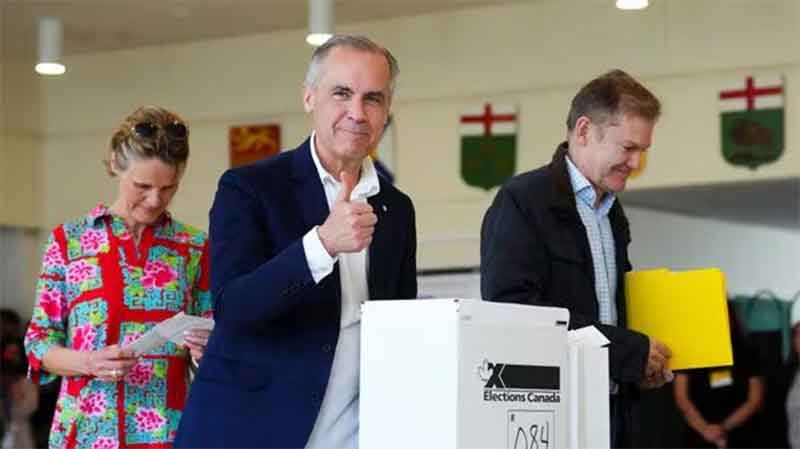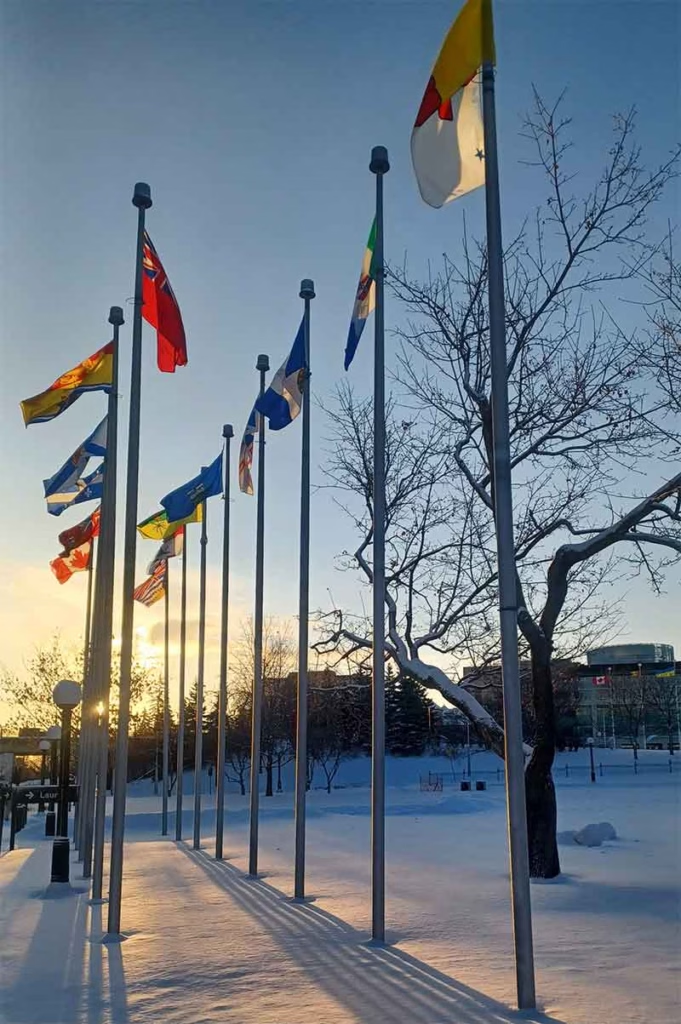
Canada held its general election during a period heavily burdened by internal and external issues. The Liberal Party, a progressive-moderate party led by Justin Trudeau for the past ten years, faced a particularly challenging 2024. The bitter experiences of four years of misrule, including the COVID period, had accumulated, and in the final months, the Prime Minister had to struggle to confront both dissent within his own rank and file besides a surging opposition. Justin Trudeau, reluctant to concede power, was unexpectedly compelled by pressure to appoint his own former economic advisor, Mark Carney, and step down. Thus, someone who was not a Member of Parliament and a newcomer to politics was crowned as Canada’s interim Prime Minister.
In the general election held in the last week of April 2025, the Liberal Party, led by Mark Carney, is poised to secure a fourth term in power, winning 169 out of the total 343 constituencies. Mark Carney will be the twenty-fourth Prime Minister in Canada’s history. The Liberal Party is bringing in Carney as a savior during a difficult period gripped by inflation, soaring cost of living, housing shortages, and rampant crime. Although not a familiar face in politics, the sixty-year-old Carney, an expert in economics, has the backing of educational achievements from Harvard and Oxford Universities. His previous roles as the 120th Governor of the Bank of England and former Governor of the Bank of Canada add weight to his new position. From the moment he was chosen during this trial period, he has been intensely focused on regaining the party’s lost image. The responsibility of rescuing the party from the mismanagement left behind by Trudeau and revitalizing it was an extremely demanding task.
Realizing that the carbon tax he himself had previously advised Trudeau on had backfired (he was even initially nicknamed ‘Carbon Tax Carney’ by the public), he removed it immediately upon assuming office. As a result, the public received some slight financial relief too. Although the Liberal Party emerged as the single largest party, with 169 seats, they would need the support of at least 172 members to govern. This means they will have to seek the support of either the Bloc Québécois, a party dominant only in Quebec with 22 seats in third place, or the New Democratic Party (NDP) in fourth place with 7 seats.
Trump’s American Tariff Games
This is a time when even international markets are reeling from the ‘administrative reforms’ implemented by Donald Trump immediately after assuming office as the new leader of the United States. He has alienated even Canada, a neighboring country and a long-standing, most trusted ally, by imposing harsh retaliatory tariffs. Initially, everyone considered it a joke when Trump said he would make Canada the fifty-first state of America, with a ‘take it or leave it’ attitude. It was when he referred to Justin Trudeau as the ‘governor of the state of Canada’ during Trudeau’s tenure that Canadians realized he still stood by his words. The retaliatory tariffs indicated that the matter could become serious. Recognizing that Trump would be a stumbling block to Canada’s own existence, Canadians unanimously stood together and told Trump that this would not fly and that it was best to take what was on the stove. This time, all parties discussed with the public how to confront the American trade war. It is this mission that the people have now entrusted to Mark Carney. As Trump completes 100 days in office, even opinion polls in America show him to be the least popular president so far.
Pierre Poilievre – Leader of the Canadian Conservatives
Although opposition leader Pierre Poilievre lost the election, he can claim to have increased his own party’s seats from 120 to 144. It must be assumed that although Poilievre led in opinion polls during the final days of the Trudeau government and immediately after Carney took office, his popularity subsequently declined. The fact that the constituency he had held for 20 years abandoned a leader who had tirelessly traveled across Canada, neglecting his own riding, to elevate the party to a good position astonished the public. The strained relationship between Pierre Poilievre and Doug Ford, the leader of his own party governing the province of Ontario, also dealt a blow to the party. Canada assesses that although Pierre Poilievre was ahead in public support when Justin Trudeau stepped down, he gradually lost it.
Jagmeet Singh – Leader of the New Democratic Party
Jagmeet Singh, a leader of Indian Punjabi heritage, will now be known in Canadian history as the leader whose own constituency rejected him, while also reducing the traditionally left-leaning New Democratic Party from 24 to 7 seats. The party, which was once the main opposition, has been rejected this time due to its current pro-Khalistan stance, which alienated both the party and its leader. The previous government had governed with their external support. This time too, Carney’s government might need their support.
Bloc Québécois – Leader Yves-François Blanchet
The Bloc Québécois, a party that once held sway in Quebec with 33 seats, is now reduced to 22 seats. It finished third in the current election. Quebec is a Canadian province with a majority of French-speaking people. Although the party seeks full autonomy for the province, it is not overtly active in advocating for centralized sovereignty at the moment. The party’s leader is Yves-François Blanchet. To secure a majority for Carney’s government, their or the New Democratic Party’s support will be essential.
Governing with the external support of another party, resulting in a minority government, will make the term in office challenging for Carney and his team.
Mark Carney, who gained popularity through the new election, now bears heavy responsibilities. He needs to convene Parliament, present a new budget, and remove existing inter-provincial trade barriers. With the old warmth lost in relations with the United States, Carney also has the responsibility of making Canada self-reliant to the greatest extent possible. Trump’s daily shifts in stance and moving of goalposts will be a headache for Canada, just as it is for many others. Over the past five years, the price of homes in Canada has risen beyond what the common person can afford. Strict regulations and the scarcity of homes will leave the dreams of new families for permanent residence as mirages. It will push the dreams of the common person further away.
Heavy Burdens and a Crown of Thorns
Although the Bloc Québécois’s secessionist demands have been limited to below 30%, the issue could resurface as a referendum in the state election next year. Similar waves of secessionist and autonomy demands have also begun to emerge in Alberta. Creating a united front of provinces to stand together against Trump’s erratic administrative reforms will also be the responsibility of those steering the federal government. Canada also faces numerous challenges in the primary healthcare sector, with many inaccessible hurdles for ordinary people. The latest available Canadian healthcare report indicates a shortage of 23,000 family doctors. In addition, thousands more healthcare worker vacancies need to be filled. Even if there are concessions or relief in the trade war with the United States, the Bank of Canada has already indicated the possibility of an economic recession. In any case, Canada is in a position where it cannot move forward by considering America a trusted friend as it once did.
The scarcity of housing and strict regulations also affect immigrants to Canada. The reduction in entry permits for temporary workers and students has adversely affected the country’s economy. More than 28,000 immigration applications remain pending decision, and Canada is currently facing a situation where existing immigration laws clash with the increasing flow of refugees. The excessive increase in crimes, including car thefts and burglaries, needs to be curbed. Legislation needs to be enacted against repeat offenders being quickly released on bail and re-engaging in criminal activities. There are defense contracts that need to be completed. There are complaints that Canada is not complying with the defense agreements of the NATO alliance, which includes the United States. Fulfilling these would require Canada to find $18 billion each year.
Subscribe to Our Newsletter
Get the latest CounterCurrents updates delivered straight to your inbox.
In short, this is a four-year promotion for Mark Carney, who applied for and got the job of an economic expert; the only difference is that he carries a heavy cross of domestic problems on his shoulders and a crown of thorns of international pain on his head!
Suresh Nellikode is a political commentator and film critic














































